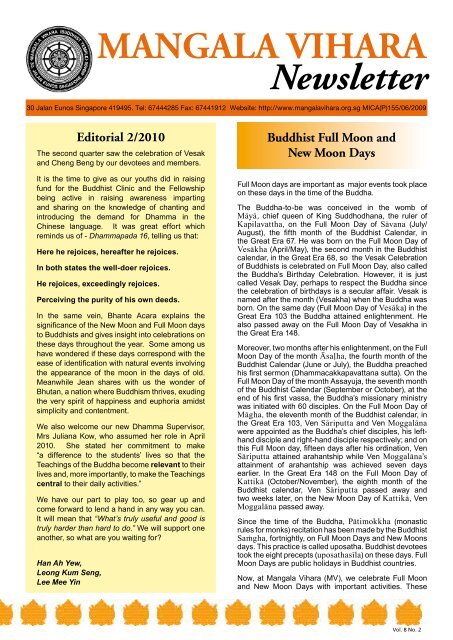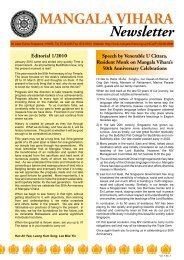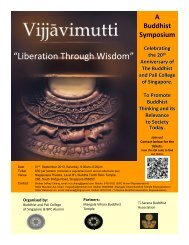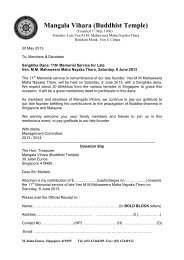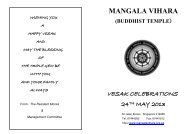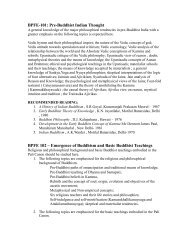MANGALA VIHARA Newsletter
MANGALA VIHARA Newsletter
MANGALA VIHARA Newsletter
You also want an ePaper? Increase the reach of your titles
YUMPU automatically turns print PDFs into web optimized ePapers that Google loves.
<strong>MANGALA</strong> <strong>VIHARA</strong><br />
<strong>Newsletter</strong><br />
30 Jalan Eunos Singapore 419495. Tel: 67444285 Fax: 67441912 Website: http://www.mangalavihara.org.sg MICA(P)155/06/2009<br />
The second quarter saw the celebration of Vesak<br />
and Cheng Beng by our devotees and members.<br />
It is the time to give as our youths did in raising<br />
fund for the Buddhist Clinic and the Fellowship<br />
being active in raising awareness imparting<br />
and sharing on the knowledge of chanting and<br />
introducing the demand for Dhamma in the<br />
Chinese language. It was great effort which<br />
reminds us of - Dhammapada 16, telling us that:<br />
Here he rejoices, hereafter he rejoices.<br />
In both states the well-doer rejoices.<br />
He rejoices, exceedingly rejoices.<br />
Perceiving the purity of his own deeds.<br />
In the same vein, Bhante Acara explains the<br />
significance of the New Moon and Full Moon days<br />
to Buddhists and gives insight into celebrations on<br />
these days throughout the year. Some among us<br />
have wondered if these days correspond with the<br />
ease of identification with natural events involving<br />
the appearance of the moon in the days of old.<br />
Meanwhile Jean shares with us the wonder of<br />
Bhutan, a nation where Buddhism thrives, exuding<br />
the very spirit of happiness and euphoria amidst<br />
simplicity and contentment.<br />
We also welcome our new Dhamma Supervisor,<br />
Mrs Juliana Kow, who assumed her role in April<br />
2010. She stated her commitment to make<br />
“a difference to the students’ lives so that the<br />
Teachings of the Buddha become relevant to their<br />
lives and, more importantly, to make the Teachings<br />
central to their daily activities.”<br />
We have our part to play too, so gear up and<br />
come forward to lend a hand in any way you can.<br />
It will mean that “What’s truly useful and good is<br />
truly harder than hard to do.” We will support one<br />
another, so what are you waiting for?<br />
Han Ah Yew,<br />
Leong Kum Seng,<br />
Lee Mee Yin<br />
Editorial 2/2010<br />
Buddhist Full Moon and<br />
New Moon Days<br />
Full Moon days are important as major events took place<br />
on these days in the time of the Buddha.<br />
The Buddha-to-be was conceived in the womb of<br />
MÈyÈ, chief queen of King Suddhodhana, the ruler of<br />
Kapilavattha, on the Full Moon Day of SÈvana (July/<br />
August), the fifth month of the Buddhist Calendar, in<br />
the Great Era 67. He was born on the Full Moon Day of<br />
VesÈkha (April/May), the second month in the Buddhist<br />
calendar, in the Great Era 68, so the Vesak Celebration<br />
of Buddhists is celebrated on Full Moon Day, also called<br />
the Buddha’s Birthday Celebration. However, it is just<br />
called Vesak Day, perhaps to respect the Buddha since<br />
the celebration of birthdays is a secular affair. Vesak is<br />
named after the month (Vesakha) when the Buddha was<br />
born. On the same day (Full Moon Day of VesÈka) in the<br />
Great Era 103 the Buddha attained enlightenment. He<br />
also passed away on the Full Moon Day of Vesakha in<br />
the Great Era 148.<br />
Moreover, two months after his enlightenment, on the Full<br />
Moon Day of the month ÒsaÐha, the fourth month of the<br />
Buddhist Calendar (June or July), the Buddha preached<br />
his first sermon (Dhammacakkapavattana sutta). On the<br />
Full Moon Day of the month Assayuja, the seventh month<br />
of the Buddhist Calendar (September or October), at the<br />
end of his first vassa, the Buddha’s missionary ministry<br />
was initiated with 60 disciples. On the Full Moon Day of<br />
MÈgha, the eleventh month of the Buddhist calendar, in<br />
the Great Era 103, Ven SÈriputta and Ven MoggalÈna<br />
were appointed as the Buddha’s chief disciples, his lefthand<br />
disciple and right-hand disciple respectively; and on<br />
this Full Moon day, fifteen days after his ordination, Ven<br />
SÈriputta attained arahantship while Ven MoggalÈna's<br />
attainment of arahantship was achieved seven days<br />
earlier. In the Great Era 148 on the Full Moon Day of<br />
KattikÈ (October/November), the eighth month of the<br />
Buddhist calendar, Ven SÈriputta passed away and<br />
two weeks later, on the New Moon Day of KattikÈ, Ven<br />
MoggalÈna passed away.<br />
Since the time of the Buddha, PÈtimokkha (monastic<br />
rules for monks) recitation has been made by the Buddhist<br />
SaÑgha, fortnightly, on Full Moon Days and New Moons<br />
days. This practice is called uposatha. Buddhist devotees<br />
took the eight precepts (uposathasÉla) on these days. Full<br />
Moon Days are public holidays in Buddhist countries.<br />
Now, at Mangala Vihara (MV), we celebrate Full Moon<br />
and New Moon Days with important activities. These<br />
Vol. 8 No. 2
activities are wholesome deeds or meritorious acts.<br />
When flowers, candles, etc. are offered to the Buddha,<br />
special chanting is performed, special lunch donations<br />
are served to members and devotees, and special<br />
blessings and evening dhamma talks are delivered by<br />
resident monks.<br />
Actually these good deeds can be done anywhere at<br />
any time. So, why are these done on Full Moon and New<br />
Moon Days only? The answer is simply that we cannot<br />
do these good deeds every day. So Full Moon and New<br />
Moon Days are selected for the performance of these<br />
meritorious deeds.<br />
Another reason or explanation is as follows: According<br />
to the CatumahÈrÈja-sutta of AËguttara NikÈya (TikanipÈta,<br />
The Threes), ministers of the four great kings of<br />
gods namely RataraÍÍha, VirÊlaka, VirÊpakkha, and<br />
Kuvera, come down to the human world on the eighth<br />
waxing and waning days; sons of the kings of gods come<br />
down to the human world on the fourteenth new moon<br />
days; and the kings of gods themselves come down to<br />
the human world on the fifteenth Full Moon and New<br />
Moon Days.<br />
It should then be noted that in the Buddhist calendar<br />
there are the two types of New Moon Days: one falls on<br />
fourteenth waning day which is the end of month, and<br />
the other falls on the fifteenth waning day which is also<br />
the end of month. Full Moon Days fall in the middle of a<br />
month and always upon the 15th day of the waxing of the<br />
moon. There are 12 calendar months and the months<br />
have alternate 29 days and 30 days. The first month<br />
of the calendar has 29 days, the second month has 30<br />
days, and so on. And days are counted from 1 to 14 or<br />
15, not from 1 to 29 nor 1 to 30 as in other calendars. For<br />
example, days of the calendar are waxing 1 to 15 and<br />
waning 1 to 14 or 15. Thus in the Buddhist calendar, the<br />
New Moon Day (and the end of the month) may fall on<br />
either the 14th or 15th waning day of the moon.<br />
These celestial beings observe the human world. They<br />
want to know if human beings are performing meritorious<br />
deeds and thus may be reborn in the deva world and<br />
populate it with merit makers. That is why at Mangala<br />
Vihara Full Moon and New Moon Days are selected for<br />
the performance of special meritorious deeds so that our<br />
wholesome deeds can be recognised by celestial beings<br />
who, as it is traditionally believed, regularly come to the<br />
human world to observe us.<br />
One of distinguished MV’s celebrations is Pin Kamma,<br />
celebrated on Full Moon and New Moon Days. Pin<br />
Kamma is a Sri Lankan word derived from PÈÐi. The<br />
original PÈÐi word for Pin Kamma is PuÌÌa Kamma that<br />
means wholesome (PuÌÌa) act (Kamma) or meritorious<br />
(PuÌÌa) deed (Kamma). In Sri Lanka almost all<br />
Buddhist religious ceremonies are called Pin Kamma<br />
or Pin Kama (PuÌÌa Kamma). For example, there<br />
are ceremonies of Vesak Pin Kamma (Vesak Day or<br />
Buddha Day Celebration), Kathina Pin Kamma (Kathina<br />
Robe Donation Ceremony), Seventh Day Pin Kamma<br />
(Transfering Merit to a Departed One on the Seventh Day<br />
Counted from the Day on which he or she passed away),<br />
and Bana Pin Kamma (Ceremony of Buddhist Religious<br />
Sermon). Actually all the Buddhist ceremonies might be<br />
named Pin Kamma. Very often Kamma is spelled with<br />
only one ‘m’; that is, Pin Kama.<br />
At Mangala Vihara this name (Pin Kamma) is only<br />
applied to the meritorious deeds that are done on Full<br />
Moon and New Moon Days. More specifically, the lunch<br />
donations to the resident monks, members and devotees<br />
made on those days are called Pin Kamma. This is one<br />
of the TheravÈda practices of Mangala Vihara, initiated<br />
by the late founder Bhante, MM MahÈvÉra who was a Sri<br />
Lankan monk. It is believed that the founder gave the Sri<br />
Lankan name of the meritorious deed (Pin Kamma) to the<br />
lunch donations at Mangala Vihara. This name is given<br />
to this merit only and thus this has become significant.<br />
In conclusion, Full Moon Days and New Moon Days are<br />
very important, as has been described. Extraordinary<br />
meritorious deeds which cannot easily be performed<br />
every day are reserved for these days.<br />
Ven.Dr.Ashin Acara<br />
Mangala Vihara Dhamma Fellowship<br />
In the six months since the official launch of Mangala<br />
Vihara Dhamma Fellowship (MVDF) on the 22 November<br />
2009 the Committee Members spent a challenging time<br />
with Ven Raja’s guidance to plan the following activities:<br />
1) Maranassati Chanting practice<br />
2) Sunday Class Puja Chanting practice<br />
3) Dhamma Sharing Sessions<br />
4) Evening Mandarin Dhamma classes<br />
5) Buddhanussati Chanting on the first Sunday evening<br />
of every month<br />
6) Show-case Sunday Dhamma Classes to the public in<br />
MV 50th Anniversary Celebrations<br />
7) Vesak Day recruitment of students for the new term<br />
8) Orientation sessions for new students on 13 June<br />
and 4 July 2010<br />
to participate in our activities to create a more vibrant<br />
environment in the Mangala Vihara. We thank all those<br />
who participated in the activities organised and we look<br />
forward to your continued support.<br />
We will continue to carry out our mission to<br />
• Learn the Dhamma<br />
• Practise compassion, gratitude and generosity<br />
• Share our knowledge selflessly and propagate the<br />
seeds of Buddhism<br />
Raymond Yow<br />
Chairman, MVDF<br />
The Committee worked very hard to encourage members<br />
Page 2
Vesak Day Celebrations: 27 & 28 May 2010<br />
Devotees help – cutting vegetables, preparing holy water - before the Vesak Celebration<br />
Feeding our members and devotees on Vesak Day<br />
Dhamma Corner, reaching out to the interested<br />
Dhamma Corner, reaching out to the interested<br />
Page 3
Display of Sivali Relics for public viewing during Vesak<br />
Vesak Night procession<br />
Page 4
Heaven on Earth<br />
I went to heaven, briefly, not on a neardeath-experience.<br />
I was among the 16<br />
Buddhist & Pali College alumni and family<br />
members who travelled to Bhutan in May<br />
2010.<br />
Immediately upon arrival, I went into a<br />
flutter. It could be the high altitude oxygenthin<br />
air, but it was more likely I was a little<br />
overwhelmed by the spectacular mountain<br />
peaks and the strong scent of lush valleys<br />
of this Himalayan kingdom.<br />
Every day pine and sandalwood trees<br />
lining the roads greeted us like fans<br />
waiting for their idols. Terraced rice<br />
fields glittering in the sun and crystal<br />
clear water trickling down the rivers<br />
covered the entire countryside. They<br />
provided the lights and the sound effects<br />
fit for a world-class performance. Majestic<br />
fortresses, fascinating architecture and<br />
colourful religious painting provided the<br />
grand backdrop for the ‘stage’. Yet it was<br />
the demeanour and the smiles of the<br />
Bhutanese people which stole the show.<br />
Evidently the lay people live their<br />
lives adhering closely to the Buddha’s<br />
teachings. They are also supported by<br />
Buddhist monarchs who rule the country<br />
like Emperor Asoka did his empire in India<br />
two millennia ago.<br />
In the 7th century, Tibetan King Songsten<br />
Gampo ordered the building of Buddhist<br />
monasteries in the Himalayan region to<br />
subdue the evil spirits. This sowed the<br />
seeds of Vajrayana Buddhism in Bhutan.<br />
The Bhutanese embrace a lifestyle that<br />
is poor in material possessions but rich in<br />
religious rituals and traditional arts. They<br />
cleverly use modern technology but keep<br />
mindless consumerism at bay.<br />
In 2006, the fourth King of Bhutan, a<br />
wise and benevolent Buddhist monarch,<br />
announced that he would voluntarily give<br />
up his executive powers and introduced<br />
democracy into the country. In 2008, his<br />
son and the fifth King of Bhutan carried<br />
through the promise for the youngest<br />
democracy in the world to allow the small<br />
nation to keep pace with the fast changing<br />
world.<br />
Subscribing to a unique development<br />
philosophy based on the principles of<br />
Gross National Happiness, the elected<br />
Bhutanese government promotes a<br />
casteless society and equality of the<br />
genders. Both the government and<br />
its people are un-compromising on<br />
environment conservation and diligent<br />
towards protecting ecology and wildlife.<br />
Bhutan is also well-known for the policy of<br />
‘high value, low volume’ tourism.<br />
I wondered, naturally, how the Bhutanese,<br />
in their simple material existence, maintain<br />
equanimity in the face of the influx of the<br />
‘high value’ tourists. This material-bias<br />
thoughts of mine was squashed early<br />
during my stay in Bhutan.<br />
Perhaps it is their realisation of<br />
contentment, perhaps it is their perfection<br />
in mudita, and the Bhutanese I met on my<br />
journey appeared to be already in a state<br />
of mind far more enriched and happier than<br />
mine and most people I know.<br />
If one’s state of mind defines one’s realm<br />
of existence, the Bhutanese, I can say, are<br />
in heaven.<br />
As I was packing up for my flight back to<br />
Singapore, I panicked for a moment. I had<br />
no souvenir to give to friends and colleagues<br />
back home; I had hardly a memento for my<br />
travel scrapbook. I realised I had seen<br />
heaven and this memory I will share with<br />
all. Heaven … on earth is where the good<br />
is embraced, where nature is cherished<br />
and where those in power are virtuous and<br />
caring. Heaven… is a state of mind where<br />
the brahma-viharas dwell and where<br />
contentment is prized as the greatest<br />
wealth.<br />
By Jean Lau<br />
Buddhist and Pali College of Singapore<br />
Teacher<br />
Page 5
Youth Circle Report<br />
VESAK FUND-RAISING (28 and 30 May 2010)<br />
The youths were on their feet again in Vesak celebrations,<br />
spending some weeks creating beautiful handphone and<br />
other accessories for sale to raise funds. In addition,<br />
some youths also picked up skills on using Henna under<br />
the guidance of teacher Leong Lye Cheu to set up another<br />
stall for Henna. They raised a total sum of $939.10.<br />
ANNUAL FUND-RAISING IN AID OF BUDDHIST<br />
FREE CLINIC (6 June 2010)<br />
This was the sixth year of participation in fund-raising<br />
for the Buddhist Free Clinic organised by the Buddha<br />
of Medicine Welfare Society in conjunction with Vesak<br />
celebrations, in the open field next to the Eunos MRT<br />
station. The youths, mentor and parent volunteer spent<br />
half a day on the eve of the event to cut and pack 30<br />
boxes of Kueh Lapis sponsored by Jason Chua, a regular<br />
sponsor to this yearly event. They raised $976.00.<br />
Rita Lee<br />
Youth Mentor<br />
Dhamma Supervisor’s Report<br />
And what is good, Phaedrus,<br />
And what is not good –<br />
Need we ask anyone to tell us these things?<br />
The epitaph from Robert M. Pirsig’s seminal work, Zen<br />
and the Art of Motorcycle Maintenance, cleverly sums up<br />
my motivation to assume the role of Dhamma Supervisor<br />
at Mangala Vihara (Buddhist Temple).<br />
I was overwhelmed with mixed feelings when I was told<br />
of my appointment as the new Dhamma Supervisor. I<br />
was honoured for the trust that has been placed on me<br />
but at the same time, panic set in. Though I am always<br />
easily excited when it comes to education, especially<br />
Dhamma education, my immediate concern was “where<br />
on earth am I going to find the time?” I am fully aware of<br />
the time, emotional and physical commitment required of<br />
me as a Dhamma Supervisor.<br />
I could not dwell in a self doubt simply because if<br />
everyone were to think that way, what would become of<br />
the Dhamma, and the good work the Temple has done<br />
for the past 50 years to benefit my generation, and those<br />
of my children? I turned to managing my time better. No<br />
sooner than the 2nd monthly Teachers’ Meeting I started<br />
to champion the formulation of a structured curriculum<br />
for the children at the school. I have placed this as my<br />
first priority because the children are our future.<br />
Jessy Phua (my predecessor) for all the efforts that she<br />
has put in to run the school. I am tremendously grateful<br />
for her guidance and to all the volunteers (teachers, F&B<br />
and Maintenance teams) who have put in hours just<br />
so that we could continue with the legacy of Dhamma<br />
education in MV.<br />
I can promise no big changes but I can promise one thing<br />
– my commitment in making a difference to the students’<br />
lives so that the Teachings of the Buddha become<br />
relevant to their lives and, more importantly, to make the<br />
Teachings central to their daily activities.<br />
Juliana Kow<br />
Dhamma Supervisor 2010/2011<br />
Mrs Juliana Kow is currently the Head of Department<br />
(English Language) in a local school. Her current<br />
appointment as Dhamma supervisor of the Sunday<br />
Dhamma School extends her wealth of supervisory<br />
experiences to MV. We are sure that with her commitment<br />
to her appointment she will undoubtedly bring MV through<br />
a new milestone in the education of all in the Theravada<br />
Buddhist community.<br />
The work of Dhamma Supervisor – like that of a mother<br />
to a child – is never done. No week ever passes without<br />
me fretting over what to say at the ‘mount’, to motivate<br />
my Dhamma teachers to continue propagating the Truth,<br />
promote the students’ interests in their Buddhist studies,<br />
and the list goes on. My personal philosophy, in times of<br />
uncertainties is to press on and give my best.<br />
I would like to take this opportunity of my maiden entry in<br />
the MV <strong>Newsletter</strong> to register my heartfelt thanks to Mrs<br />
Dhamma Supervisor, Juliana (right) receiving certificate of<br />
appointment from Management Secretary, Jenny (left)<br />
Page 6
<strong>MANGALA</strong> <strong>VIHARA</strong> DIARY<br />
CHENG BENG – Sunday, 4 APRIL 2010<br />
A mass transferring of merits was conducted after the<br />
evening religious service by pouring water from a teapot<br />
into a glass whilst the congregation of members and<br />
devotees chanted, “idam me natinam hotu”. Bhante<br />
Cittara led the recitation of the Tirokuddha sutta with<br />
the verses displayed on the LCD screens. The Hon.<br />
Secretary and her assistants read out the names of<br />
the donors and their late relatives and friends. Light<br />
refreshment followed.<br />
40TH ANNUAL GENERAL MEETING – Sunday, 18<br />
APRIL 2010<br />
Our 40th AGM commenced half an hour later at 1.30 pm<br />
from lack of quorum. Our Resident Monk, Ven Cittara,<br />
administered the Five Precepts and addressed the<br />
members. Chairman also addressed themthanked them<br />
for their attendance at the AGM and taking an active<br />
interest in the temple’s affairs. He also thanked all for<br />
helping to make the 50th Anniversary a success. After<br />
several queries on the accounts, the election of office<br />
bearers concluded the meeting.<br />
VISIT BY DHARMA STUDENTS FROM<br />
SAGARAMUDRA BUDDHIST SOCIETY – 9 MAY 2010<br />
Sixty Dharma students from Sagaramudra Buddhist<br />
Society visited MV to better understand Theravada<br />
Buddhism. Dhamma Supervisor, Mdm Juliana Kwang,<br />
warmly welcomed them and explained the Theravada<br />
tradition of paying respects to the Triple Gems, the murals<br />
in the Shrine hall, the significance of the Bodhi tree, a<br />
short history of our founder and a tour of the temple.<br />
VESAK EVE – Thursday, 27 MAY 2010<br />
More helpers, helped prepare the ingredients for cooking<br />
and decorate the buildings for Vesak,, The recitation of<br />
the Maha Samaya Sutta at the evening puja was led by<br />
Bhantes Dr Ashin Acara and Seelananda, to bless 6,000<br />
holy water bottles and 5 colored-threads for distribution<br />
on Vesak Day. Everything was ready by 10 am.<br />
VESAK DAY – Friday, 28 MAY 2010<br />
Many devotees came from 5.30 am. After the 6.30 am<br />
puja breakfast was served to our four resident monks .<br />
Many visitors were blessed by Bhantes Cittara, Dr Ashin<br />
Acara, Seelananda and Raja. By 9.00 am the temple<br />
was a hive of activities with the exhibition of the relics of<br />
Buddha and Arhat Sivali, offerings of light at the Buddha<br />
image in the Shrine Hall and Bodhi Tree, lotus candles,<br />
stall of flowers, drink stall, bookstall displayof the 50th<br />
Anniversary souvenir books & Sivali Yantra, Sunday<br />
school recruitment, Buddhist & Pali College recruitment .<br />
After the 10.45 am Puja, it was to collect Holy water or<br />
have lunch. Three and a half rounds (55 tables each) of<br />
lunch were served to devotees from 11.30 am to 2.30 pm.<br />
Excess food was given as take-aways to late comers.<br />
After the evening service five ladies and five gentlemen<br />
recited stanzas in Pali on the First Utterance of the<br />
Buddha after his Enlightenment and the Dependent<br />
Origination. Narrators of the story in English were trained<br />
by Bhantes Cittara and Seelananda. Members then<br />
prepared for the procession – two palanquins for Buddha<br />
and Arhat Sivali’s relics were carried in the traditional<br />
candlelight procession with three groups of men-in-white<br />
carrying them.<br />
VESAK FAMILY FUN FAIR – Sunday, 6 JUNE 2010<br />
MV Youth Group once again helped raise funds for the<br />
Singapore Buddhist Free Clinic. With their teacher, Mdm<br />
Rita Leeand Mdm Florence Chua, they sold kueh lapis<br />
of many favours : fruit, chocolate and original. . The<br />
Management Committee was grateful to all involved<br />
8th MEMORIAL SERVICE - LATE FOUNDER –<br />
Saturday, 12 JUNE 2010<br />
A Sanghika Dana was offered on to 24 monks from the<br />
various Sri Lankan, Thai and Burmese temples including<br />
our four resident monks. The merits accrued were shared<br />
with our late founder, Ven M M Mahaweera. Vegetarian<br />
lunch was also served. The monks were chauffeured to<br />
and from temples as arranged by Mrs. Maureen Aw. The<br />
Management Committee thanks the following devotees<br />
for their time and effort to chauffeur the monks:<br />
1) Mr. Philip Chan<br />
2) Mr. Wee Lian Teck<br />
3) Mr. Alex Wee<br />
4) Ms Anne Lee<br />
5) Mr. John Lee<br />
6) Ms Wong Lu Chin<br />
7) Mdm. Helen Tan<br />
8) Mr. Leong Kum Kei<br />
9) Mr. Yuen Hong Kiat<br />
10) Mr. Leonard Frida<br />
Bhante Cittara delivered a sermon on “Gratitude”,<br />
with our Chairman, Mr. Lim Ah Swan, representing<br />
all members and devotees, offering a bouquet at late<br />
Bhante’s statue. Then all proceeded to the Bodhi tree<br />
to recite the Bojjhanga suttas and transferring of merits<br />
at the Shrine Hall. It ended with the chanting of Chatta<br />
Manava Gatha and light refreshment.<br />
Page 7
<strong>MANGALA</strong> <strong>VIHARA</strong> DIARY<br />
WEEKLY DHAMMA SUTTAS’ DISCUSSION at Chew Quee Neo Hall<br />
Monks Date Time / Day Title<br />
Bhante Acara 11 Apr 12.45 to 1.45 pm Anguttara Nikaya – The Book of Gradual Sayings by the Buddha<br />
(Sundays)<br />
16 May What’s the name of the mind and the forces driving the mind?<br />
14 June The Nature of the mind and the forces driving it and Practising Metta<br />
meditation and its benefits<br />
20 June Good and bad friendship, its influence and role in your life – from the<br />
Book of Gradual Sayings Anguttara Nikaya<br />
Bhante Cittara 2 May 12.45 to 1.45 pm A Buddhist Perspective of Natural disasters<br />
(Sundays)<br />
30 May Truth to be told or Not to be told<br />
6 June Pattanikujjana Sutta from Anguttaranikaya, the Book of Gradual Sayings<br />
These sessions were open to teachers, students, members and devotees.<br />
NEW MEMBERS<br />
We welcome the following new members to our temple, whose memberships were approved during April to Jun 2010<br />
period.<br />
1) Mr. Tham Saik Hoong 2) Mdm. Tan Lay Kheng<br />
3) Mdm. Lim Chee Tsing 4) Mr. Lee Teng Yong<br />
5) Mdm. Tang Chuay Har 6) Mdm. Christine Eng Sai Hwa<br />
7) Mr. Tan Yew Beng 8) Mdm. Usha Rani<br />
9) Mdm. Doris Yip Lai Yin 10) Mr. Chan Tiong Gim<br />
11) Mdm. Diong Meei Lan 12) Mr. Chang Kwai Sang<br />
13) Ms Linda Sim Hwee Ai 14 Mdm. Cynthia Tan Chui Peng<br />
15) Ms. Lim Soo Huang 16) Mr. Lau Ng Siong<br />
17) Mr. Baldwin Foo 18) Mdm. Foo Woon Chun<br />
19) Mr. Adrian Yong Wei Sun 20) Mr. Robert Tan Chiu Teng<br />
21) Mdm. Mabel Chua Khar Gek 22) Mr. Alex Lim Soon Ser<br />
23) Mdm. Hoepfner-Chen Kwai Cheng 24) Ms Ang Lee Im<br />
25) Mr. Quek Hong Toh 26) Mr. Lim Lee Hock<br />
27) Ms Winnie Tsin 28) Ms Doris Sim Hwee Kheng<br />
29) Ms Lilian Song Gek Choo<br />
OBITUARY<br />
We regret the passing away of our member, Mr. Richard<br />
Ong Seok Hee on 29 Jun 2010. Uncle Richard, once<br />
served as Assistant Treasurer in the Management<br />
Committee. He had selflessly took upon himself to<br />
prepare drinks for all occasions (lunches on Sundays,<br />
Vesak and other celebrations), and help in the kitchen,<br />
repair electrical appliances and chokes. He will always<br />
be remembered as our active member. The temple<br />
has suffered a great loss with his passing away. “Uncle<br />
Richard, we will always remember you”. May you be<br />
reborn in a happy realm and attain the bliss of Nibbana.<br />
Jenny Tan (Ms)<br />
Hon. Secretary, Management Committee 2010 / 2011<br />
Page 8


